- Home
- Herman Melville
Typee: A Romance of the South Sea
Typee: A Romance of the South Sea Read online
Typee: A Romance of the South Sea
Herman Melville
Herman Melville
Typee: A Romance of the South Sea
PREFACE
MORE than three years have elapsed since the occurrence of the events recorded in this volume. The interval, with the exception of the last few months, has been chiefly spent by the author tossing about on the wide ocean. Sailors are the only class of men who now-a-days see anything like stirring adventure; and many things which to fire-side people appear strange and romantic, to them seem as common-place as a jacket out at elbows. Yet, notwithstanding the familiarity of sailors with all sorts of curious adventure, the incidents recorded in the following pages have often served, when 'spun as a yarn,' not only to relieve the weariness of many a night-watch at sea, but to excite the warmest sympathies of the author's shipmates. He has been, therefore, led to think that his story could scarcely fail to interest those who are less familiar than the sailor with a life of adventure.
In his account of the singular and interesting people among whom he was thrown, it will be observed that he chiefly treats of their more obvious peculiarities; and, in describing their customs, refrains in most cases from entering into explanations concerning their origin and purposes. As writers of travels among barbarous communities are generally very diffuse on these subjects, he deems it right to advert to what may be considered a culpable omission. No one can be more sensible than the author of his deficiencies in this and many other respects; but when the very peculiar circumstances in which he was placed are understood, he feels assured that all these omissions will be excused.
In very many published narratives no little degree of attention is bestowed upon dates; but as the author lost all knowledge of the days of the week, during the occurrence of the scenes herein related, he hopes that the reader will charitably pass over his shortcomings in this particular.
In the Polynesian words used in this volume, — except in those cases where the spelling has been previously determined by others, — that form of orthography has been employed, which might be supposed most easily to convey their sound to a stranger. In several works descriptive of the islands in the Pacific, many of the most beautiful combinations of vocal sounds have been altogether lost to the ear of the reader by an over-attention to the ordinary rules of spelling.
There are a few passages in the ensuing chapters which may be thought to bear rather hard upon a reverend order of men, the account of whose proceedings in different quarters of the globe- transmitted to us through their own hands-very generally, and often very deservedly, receives high commendation. Such passages will be found, however, to be based upon facts admitting of no contradiction, and which have come immediately under the writer's cognizance. The conclusions deduced from these facts are unavoidable, and in stating them the author has been influenced by no feeling of animosity, either to the individuals themselves, or to that glorious cause which has not always been served by the proceedings of some of its advocates.
The great interest with which the important events lately occurring at the Sandwich, Marquesas, and Society Islands, have been regarded in America and England, and indeed throughout the world, will, he trusts, justify a few otherwise unwarrantable digressions.
There are some things related in the narrative which will be sure to appear strange, or perhaps entirely incomprehensible, to the reader; but they cannot appear more so to him than they did to the author at the time. He has stated such matters just as they occurred, and leaves every one to form his own opinion concerning them; trusting that his anxious desire to speak the unvarnished truth will gain for him the confidence of his readers. 1846.
INTRODUCTION TO THE EDITION OF 1892
BY ARTHUR STEDMAN
OF the trinity of American authors whose births made the year 1819 a notable one in our literary history, — Lowell, Whitman, and Melville, — it is interesting to observe that the two latter were both descended, on the fathers' and mothers' sides respectively, from have families of British New England and Dutch New York extraction. Whitman and Van Velsor, Melville and Gansevoort, were the several combinations which produced these men; and it is easy to trace in the life and character of each author the qualities derived from his joint ancestry. Here, however, the resemblance ceases, for Whitman's forebears, while worthy country people of good descent, were not prominent in public or private life. Melville, on the other hand, was of distinctly patrician birth, his paternal and maternal grandfathers having been leading characters in the Revolutionary War; their descendants still maintaining a dignified social position.
Allan Melville, great-grandfather of Herman Melville, removed from Scotland to America in 1748, and established himself as a merchant in Boston. His son, Major Thomas Melville, was a leader in the famous 'Boston Tea Party' of 1773 and afterwards became an officer in the Continental Army. He is reported to have been a Conservative in all matters except his opposition to unjust taxation, and he wore the old-fashioned cocked hat and knee-breeches until his death, in 1832, thus becoming the original of Doctor Holmes's poem, 'The Last Leaf'. Major Melville's son Allan, the father of Herman, was an importing merchant, — first in Boston, and later in New York. He was a man of much culture, and was an extensive traveller for his time. He married Maria Gansevoort, daughter of General Peter Gansevoort, best known as 'the hero of Fort Stanwix.' This fort was situated on the present site of Rome, N.Y.; and there Gansevoort, with a small body of men, held in check reinforcements on their way to join Burgoyne, until the disastrous ending of the latter's campaign of 1777 was insured. The Gansevoorts, it should be said, were at that time and subsequently residents of Albany, N.Y.
Herman Melville was born in New York on August 1,1819, and received his early education in that city. There he imbibed his first love of adventure, listening, as be says in 'Redburn,' while his father 'of winter evenings, by the well-remembered sea-coal fire in old Greenwich Street, used to tell my brother and me of the monstrous waves at sea, mountain high, of the masts bending like twigs, and all about Havre and Liverpool.' The death of his father in reduced circumstances necessitated the removal of his mother and the family of eight brothers and sisters to the village of Lansingburg, on the Hudson River. There Herman remained until 1835, when he attended the Albany Classical School for some months. Dr. Charles E. West, the well-known Brooklyn educator, was then in charge of the school, and remembers the lad's deftness in English composition, and his struggles with mathematics.
The following year was passed at Pittsfield, Mass., where he engaged in work on his uncle's farm, long known as the 'Van Schaack place.' This uncle was Thomas Melville, president of the Berkshire Agricultural Society, and a successful gentleman farmer.
Herman's roving disposition, and a desire to support himself independently of family assistance, soon led him to ship as cabin boy in a New York vessel bound for Liverpool. He made the voyage, visited London, and returned in the same ship. 'Redburn: His First Voyage,' published in 1849, is partly founded on the experiences of this trip, which was undertaken with the full consent of his relatives, and which seems to have satisfied his nautical ambition for a time. As told in the book, Melville met with more than the usual hardships of a sailor-boy's first venture. It does not seem difficult in 'Redburn' to separate the author's actual experiences from those invented by him, this being the case in some of his other writings.
A good part of the succeeding three years, from 1837 to 1840, was occupied with school-teaching. While so engaged at Greenbush, now East Albany, N.Y., he received the munificent salary of 'six dollars a quarter and board.' He taught for one term at Pittsfield, Mass., 'boarding around' with the families of his pupils, in tru
e American fashion, and easily suppressing, on one memorable occasion, the efforts of his larger scholars to inaugurate a rebellion by physical force.
I fancy that it was the reading of Richard Henry Dana's 'Two Years Before the Mast' which revived the spirit of adventure in Melville's breast. That book was published in 1840, and was at once talked of everywhere. Melville must have read it at the time, mindful of his own experience as a sailor. At any rate, he once more signed a ship's articles, and on January 1, 1841, sailed from New Bedford harbour in the whaler Acushnet, bound for the Pacific Ocean and the sperm fishery. He has left very little direct information as to the events of this eighteen months' cruise, although his whaling romance, 'Moby Dick; or, the Whale,' probably gives many pictures of life on board the Acushnet. In the present volume he confines himself to a general account of the captain's bad treatment of the crew, and of his non-fulfilment of agreements. Under these considerations, Melville decided to abandon the vessel on reaching the Marquesas Islands; and the narrative of 'Typee' begins at this point. However, he always recognised the immense influence the voyage had had upon his career, and in regard to its results has said in 'Moby Dick,'-
'If I shall ever deserve any real repute in that small but high hushed world which I might not be unreasonably ambitious of; if hereafter I shall do anything that on the whole a man might rather have done than to have left undone… then here I prospectively ascribe all the honour and the glory to whaling; for a whale-ship was my Yale College and my Harvard.'
The record, then, of Melville's escape from the Dolly, otherwise the Acushnet, the sojourn of his companion Toby and himself in the Typee Valley on the island of Nukuheva, Toby's mysterious disappearance, and Melville's own escape, is fully given in the succeeding pages; and rash indeed would he be who would enter into a descriptive contest with these inimitable pictures of aboriginal life in the 'Happy Valley.' So great an interest has always centred in the character of Toby, whose actual existence has been questioned, that I am glad to be able to declare him an authentic personage, by name Richard T. Greene. He was enabled to discover himself again to Mr. Melville through the publication of the present volume, and their acquaintance was renewed, lasting for quite a long period. I have seen his portrait, — a rare old daguerrotype, — and some of his letters to our author. One of his children was named for the latter, but Mr. Melville lost trace of him in recent years.
With the author's rescue from what Dr. T. M. Coan has styled his 'anxious paradise,' 'Typee' ends, and its sequel, 'Omoo,' begins. Here, again, it seems wisest to leave the remaining adventures in the South Seas to the reader's own discovery, simply stating that, after a sojourn at the Society Islands, Melville shipped for Honolulu. There he remained for four months, employed as a clerk. He joined the crew of the American frigate United States, which reached Boston, stopping on the way at one of the Peruvian ports, in October of 1844. Once more was a narrative of his experiences to be preserved in 'White Jacket; or, the World in a Man-of-War.' Thus, of Melville's four most important books, three, 'Typee,' 'Omoo,' and 'White-Jacket,' are directly auto biographical, and 'Moby Dick' is partially so; while the less important 'Redburn' is between the two classes in this respect. Melville's other prose works, as will be shown, were, with some exceptions, unsuccessful efforts at creative romance.
Whether our author entered on his whaling adventures in the South Seas with a determination to make them available for literary purposes, may never be certainly known. There was no such elaborate announcement or advance preparation as in some later cases. I am inclined to believe that the literary prospect was an after-thought, and that this insured a freshness and enthusiasm of style not otherwise to be attained. Returning to his mother's home at Lansingburg, Melville soon began the writing of 'Typee,' which was completed by the autumn of 1845. Shortly after this his older brother, Gansevoort Melville, sailed for England as secretary of legation to Ambassador McLane, and the manuscript was intrusted to Gansevoort for submission to John Murray. Its immediate acceptance and publication followed in 1846. 'Typee' was dedicated to Chief Justice Lemuel Shaw of Massachusetts, an old friendship between the author's family and that of Justice Shaw having been renewed about this time. Mr. Melville became engaged to Miss Elizabeth Shaw, the only daughter of the Chief Justice, and their marriage followed on August 4, 1847, in Boston.
The wanderings of our nautical Othello were thus brought to a conclusion. Mr. and Mrs. Melville resided in New York City until 1850, when they purchased a farmhouse at Pittsfield, their farm adjoining that formerly owned by Mr. Melville's uncle, which had been inherited by the latter's son. The new place was named 'Arrow Head,' from the numerous Indian antiquities found in the neighbourhood. The house was so situated as to command an uninterrupted view of Greylock Mountain and the adjacent hills. Here Melville remained for thirteen years, occupied with his writing, and managing his farm. An article in Putnam's Monthly entitled 'I and My Chimney,' another called 'October Mountain,' and the introduction to the 'Piazza Tales,' present faithful pictures of Arrow Head and its surroundings. In a letter to Nathaniel Hawthorne, given in 'Nathaniel Hawthorne and His Wife,' his daily life is set forth. The letter is dated June 1, 1851.
'Since you have been here I have been building some shanties of houses (connected with the old one), and likewise some shanties of chapters and essays. I have been ploughing and sowing and raising and printing and praying, and now begin to come out upon a less bristling time, and to enjoy the calm prospect of things from a fair piazza at the north of the old farmhouse here. Not entirely yet, though, am I without something to be urgent with. The 'Whale' is only half through the press; for, wearied with the long delays of the printers, and disgusted with the heat and dust of the Babylonish brick-kiln of New York, I came back to the country to feel the grass, and end the book reclining on it, if I may.'
Mr. Hawthorne, who was then living in the red cottage at Lenox, had a week at Arrow Head with his daughter Una the previous spring. It is recorded that the friends 'spent most of the time in the barn, bathing in the early spring sunshine, which streamed through the open doors, and talking philosophy.' According to Mr. J. E. A. Smith's volume on the Berkshire Hills, these gentlemen, both reserved in nature, though near neighbours and often in the same company, were inclined to be shy of each other, partly, perhaps, through the knowledge that Melville had written a very appreciative review of 'Mosses from an Old Manse' for the New York Literary World, edited by their mutual friends, the Duyckincks. 'But one day,' writes Mr. Smith, 'it chanced that when they were out on a picnic excursion, the two were compelled by a thundershower to take shelter in a narrow recess of the rocks of Monument Mountain. Two hours of this enforced intercourse settled the matter. They learned so much of each other's character,… that the most intimate friendship for the future was inevitable.' A passage in Hawthorne's 'Wonder Book' is noteworthy as describing the number of literary neighbours in Berkshire:-
'For my part, I wish I had Pegasus here at this moment,' said the student. 'I would mount him forthwith, and gallop about the country within a circumference of a few miles, making literary calls on my brother authors. Dr. Dewey would be within ray reach, at the foot of the Taconic. In Stockbridge, yonder, is Mr. James [G. P. R. James], conspicuous to all the world on his mountain-pile of history and romance. Longfellow, I believe, is not yet at the Oxbow, else the winged horse would neigh at him. But here in Lenox I should find our most truthful novelist [Miss Sedgwick], who has made the scenery and life of Berkshire all her own. On the hither side of Pittsfield sits Herman Melville, shaping out the gigantic conception of his 'White Whale,' while the gigantic shadow of Greylock looms upon him from his study window. Another bound of my flying steed would bring me to the door of Holmes, whom I mention last, because Pegasus would certainly unseat me the next minute, and claim the poet as his rider.'
While at Pittsfield, Mr. Melville was induced to enter the lecture field. From 1857 to 1860 he filled many engagements in the lyceums, chiefly speaking of his adven
tures in the South Seas. He lectured in cities as widely apart as Montreal, Chicago, Baltimore, and San Francisco, sailing to the last-named place in 1860, by way of Cape Horn, on the Meteor, commanded, by his younger brother, Captain Thomas Melville, afterward governor of the 'Sailor's Snug Harbor' at Staten Island, N.Y. Besides his voyage to San Francisco, he had, in 1849 and 1856, visited England, the Continent, and the Holy Land, partly to superintend the publication of English editions of his works, and partly for recreation.
A pronounced feature of Melville's character was his unwillingness to speak of himself, his adventures, or his writings in conversation. He was, however, able to overcome this reluctance on the lecture platform. Our author's tendency to philosophical discussion is strikingly set forth in a letter from Dr. Titus Munson Coan to the latter's mother, written while a student at Williams College over thirty years ago, and fortunately preserved by her. Dr. Coan enjoyed the friendship and confidence of Mr. Melville during most of his residence in New York. The letter reads:-
'I have made my first literary pilgrimage, a call upon Herman Melville, the renowned author of 'Typee,' etc. He lives in a spacious farmhouse about two miles from Pittsfield, a weary walk through the dust. But it as well repaid. I introduced myself as a Hawaiian-American, and soon found myself in full tide of talk, or rather of monologue. But he would not repeat the experiences of which I had been reading with rapture in his books. In vain I sought to hear of Typee and those paradise islands, but he preferred to pour forth his philosophy and his theories of life. The shade of Aristotle arose like a cold mist between myself and Fayaway. We have quite enough of deep philosophy at Williams College, and I confess I was disappointed in this trend of the talk. But what a talk it was! Melville is transformed from a Marquesan to a gypsy student, the gypsy element still remaining strong within him. And this contradiction gives him the air of one who has suffered from opposition, both literary and social. With his liberal views, he is apparently considered by the good people of Pittsfield as little better than a cannibal or a 'beach-comber.' His attitude seemed to me something like that of Ishmael; but perhaps I judged hastily. I managed to draw him out very freely on everything but the Marquesas Islands, and when I left him he was in full tide of discourse on all things sacred and profane. But he seems to put away the objective side of his life, and to shut himself up in this cold north as a cloistered thinker.'

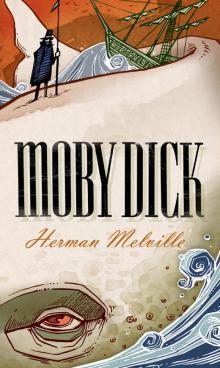 Moby Dick; Or, The Whale
Moby Dick; Or, The Whale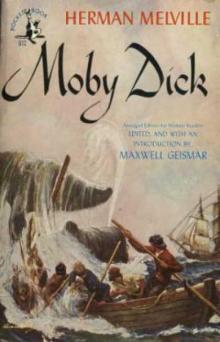 Moby Dick
Moby Dick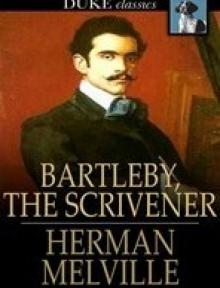 Benito Cereno and Bartleby the Scrivener
Benito Cereno and Bartleby the Scrivener Israel Potter: His Fifty Years of Exile (Annotated Edition)
Israel Potter: His Fifty Years of Exile (Annotated Edition)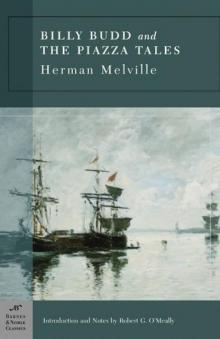 Billy Budd and the Piazza Tales
Billy Budd and the Piazza Tales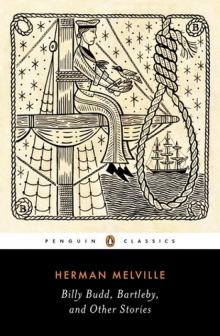 Billy Budd, Bartleby, and Other Stories
Billy Budd, Bartleby, and Other Stories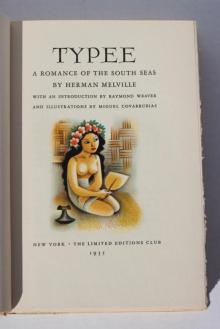 Typee: A Romance of the South Seas
Typee: A Romance of the South Seas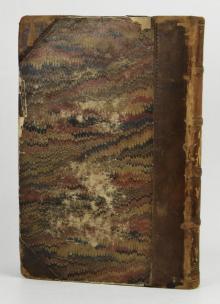 Omoo: Adventures in the South Seas
Omoo: Adventures in the South Seas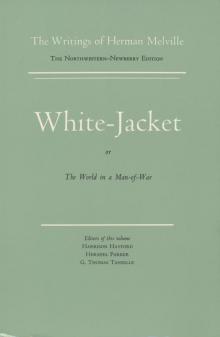 White Jacket; Or, The World on a Man-of-War
White Jacket; Or, The World on a Man-of-War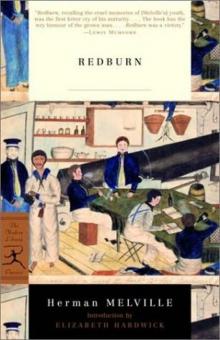 Redburn. His First Voyage
Redburn. His First Voyage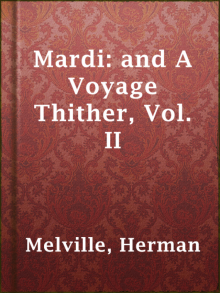 Mardi: and A Voyage Thither, Vol. II
Mardi: and A Voyage Thither, Vol. II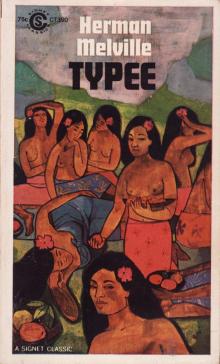 Typee
Typee The Paradise of Bachelors and the Tartarus of Maids
The Paradise of Bachelors and the Tartarus of Maids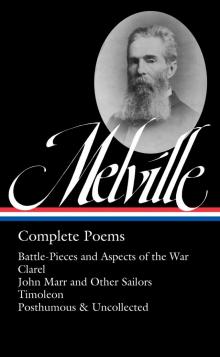 Herman Melville- Complete Poems
Herman Melville- Complete Poems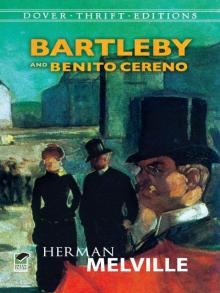 Bartleby and Benito Cereno
Bartleby and Benito Cereno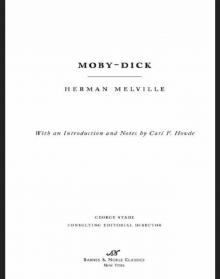 Moby-Dick (Barnes & Noble Classics Series)
Moby-Dick (Barnes & Noble Classics Series)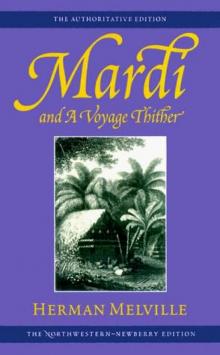 Mardi and a Voyage Thither
Mardi and a Voyage Thither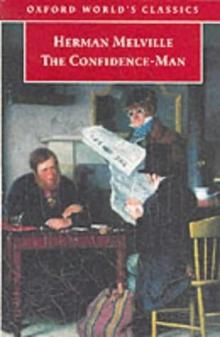 The Confidence-Man
The Confidence-Man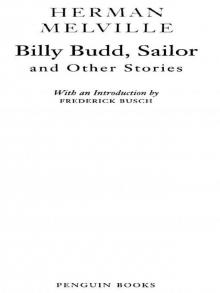 Billy Budd and Other Stories
Billy Budd and Other Stories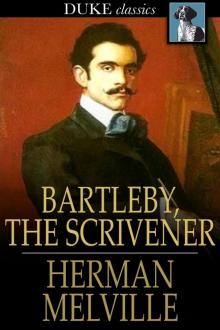 Bartleby the Scrivener
Bartleby the Scrivener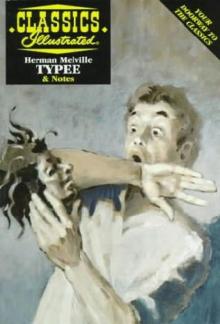 Typee: A Romance of the South Sea
Typee: A Romance of the South Sea I and My Chimney
I and My Chimney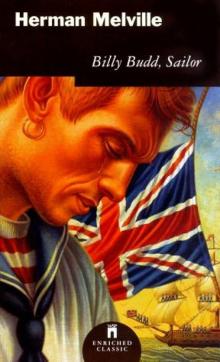 Billy Budd
Billy Budd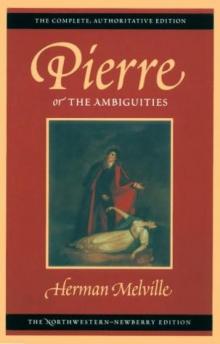 Pierre, Or the Ambiguities
Pierre, Or the Ambiguities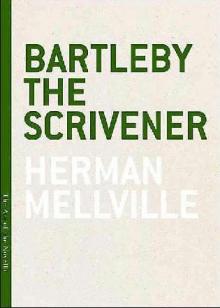 Bartleby, The Scrivener A Story of Wall-Street
Bartleby, The Scrivener A Story of Wall-Street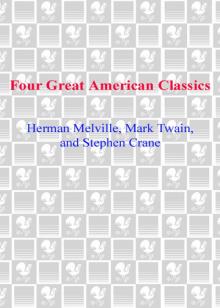 Four Great American Classics
Four Great American Classics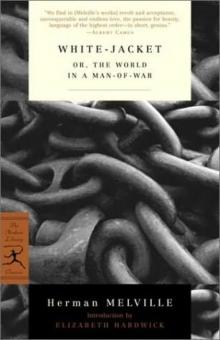 White Jacket or, The World on a Man-of-War
White Jacket or, The World on a Man-of-War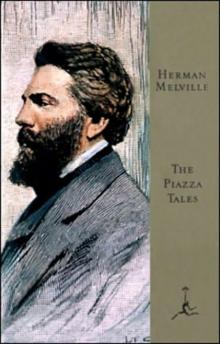 The Piazza Tales
The Piazza Tales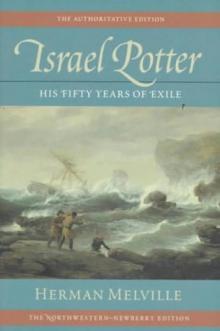 Israel Potter. Fifty Years of Exile
Israel Potter. Fifty Years of Exile